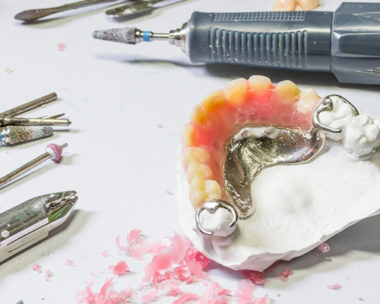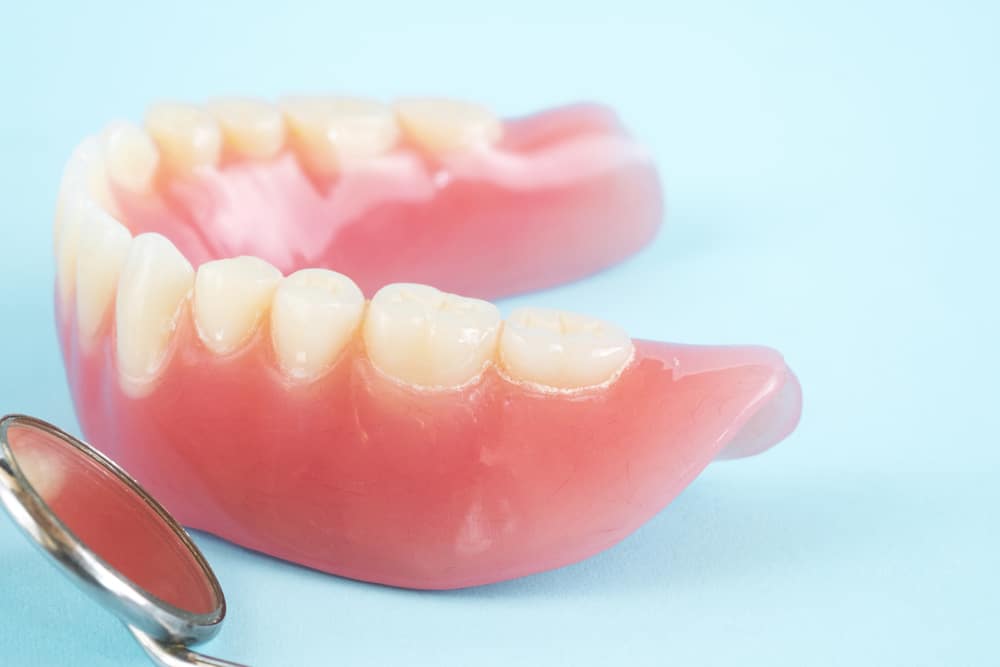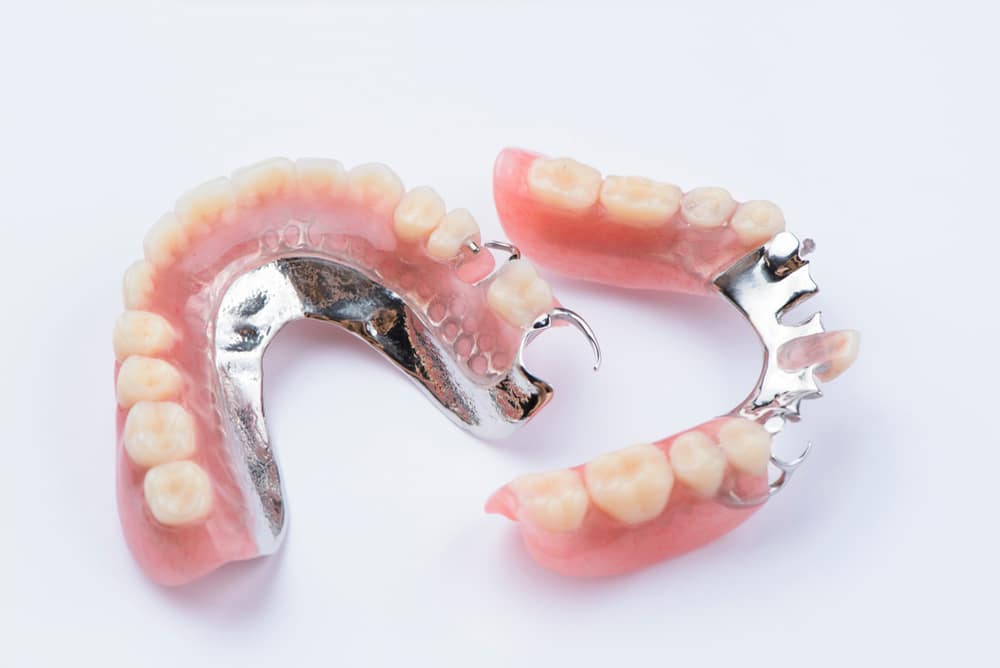Enquire Now
Fill out the form below and we will get back to you as soon as we can.
(07) 4723 1366
Mon - Fri 08:00 am - 05:00 pm


If you have several teeth missing in the top or bottom jaw, and with some natural teeth still in good condition, your dental prosthetist may recommend a Removable Partial Denture (RPD) – created here in Townsville.
Removable Partial Dentures are removable devices designed to replace your missing teeth and associated gum. They consist of replacement teeth attached to a pink or gum-coloured acrylic base. This is often connected to a metal framework that holds your denture in place in your mouth.
Wearing a partial denture offers many advantages:
If you have missing teeth, gum disease or tooth decay, dentures can help restore your ability to chew and speak properly, as well as improve your smile. While dentures are available in a variety of materials, two of the most popular are acrylic and metal (chrome cobalt).
Both materials have their benefits and drawbacks, so it’s important to consider the pros and cons of each when deciding on the best denture option for you.
Acrylic dentures are made from a plastic-based material, usually polymethyl methacrylate.
An acrylic partial denture is the most cost-effective option to replace missing teeth.
Generally speaking, they are recommended when remaining dentition is doubtful, or tooth loss is significant. These dentures have an acrylic base and if more teeth are lost, they can usually be added to the denture without great difficulty.
These dentures are easily repaired and relined. Wrought stainless steel wire clasps that clip onto the remaining natural teeth normally assists these dentures with retention.
There are a lot of benefits to acrylic dentures, including that they are lighter, more comfortable, and less expensive than metal dentures. Additionally, acrylic allows for a greater range of movement and is more flexible than metal. This makes it easier for the patient to bite and chew food. Acrylic dentures also require less maintenance than metal dentures, as they can be easily cleaned and repaired.
One of the only drawbacks of acrylic dentures is that they are more prone to breakage and wear, and they do not last as long as metal dentures.
Metal (chrome cobalt) dentures are made from a combination of chromium, cobalt and nickel alloys. These dentures also have a lot of benefits, but there are some drawbacks too.
A chrome cobalt denture (aka stainless steel dentures) has a cast metal framework structure. These dentures are renowned for being very comfortable for the wearer as they cover less of the mouth (smaller base) and are very thin, giving no bulky feeling in the mouth. Superior strength from the metal ensures that these dentures are very strong and reliable.
The chrome cobalt denture also has the advantage that the remaining teeth support the frame with retention and resting support. Therefore, there is very little pressure on the gum or bone, which results in less bone resorption (shrinking).
Metal dentures are stronger and more durable than acrylic dentures, making them better suited for patients who have a more active lifestyle. Additionally, metal dentures are more aesthetically pleasing, as they are available in a wide range of colours and styles.
While they can be a lot longer lasting, there are still some negative aspects to metal dentures. They require more maintenance than acrylic dentures, and they need to be polished on a regular basis to maintain their sheen.
Ultimately, the denture material that is best for you comes down to personal preference. Acrylic dentures are often the best option for those who are on a budget and want a lighter and more comfortable denture. However, metal dentures are more durable and aesthetically pleasing, making them the better choice for those who are more active and want a more confident smile. Ultimately, the decision should be based on your individual needs and budget.

Here at Dentures Direct, we’re dedicated to improving your quality of life, and finding the right dentures for you can be a big part of that. If you have any questions regarding which dentures are best for your lifestyle and preferences, make sure to get in touch with us.
Our friendly team members are on hand to offer advice and support, so arrange an appointment today to find out how dentures can give you your life back.

Partial dentures should be cleaned daily, keeping the following tips and information in mind:
A partial denture is usually a removable denture that replaces multiple missing teeth. You will usually be recommended a partial denture if you have at least three missing teeth next to each other. However, if you are missing most of your teeth, a full denture may be more suitable.
Partial dentures can last anywhere from five to ten years. Since they are moulded to fit your mouth, they can be relied upon to fit securely and comfortably for years to come. However, your gums and jaw can change over time, so if your dentures start to feel uncomfortable, they may need replacing.
Partial dentures tend to attach to your natural teeth via metal or plastic clasps, which hold them securely in place in your mouth for a natural look. These can easily be unclipped and removed.
One of the main advantages of partial dentures is that they help to restore your smile without you having to undergo extensive cosmetic work. Partial dentures can also help you to eat and speak as you did before losing your teeth. A lot of people opt for partial dentures because they are nearly undetectable, making them a great option to fill in any gaps.
For the first few days or weeks, you may be advised to wear your dentures 24/7, including while you sleep. This will help your gums and jawbone acclimatise to them. Much like braces, they may feel bulky or uncomfortable at first, but you will get used to this after a few days of wearing them. Beyond this, however, you should wear your dentures for at least eight hours a day – it is widely recommended that you take them out during the night (or when you sleep) in order to give your jaw a chance to relax and prevent any build-up of plaque or unnecessary rubbing.
While it won’t do you any harm, it is generally recommended that you take your dentures out while sleeping, even if it’s just to give your gums a break. After removing your dentures, make sure to clean them fully and store them in water overnight to keep them fresh. This can also help them to last longer.
A partial denture looks almost the same as a full denture. It is comprised of a skin-coloured gum segment into which the false teeth are set, and has either metal or plastic clasps. These dentures are made to look as realistic as possible so that it’s hard to tell they’re not your real teeth.
To care for your partial dentures, it is important to brush them daily to remove plaque and food debris, and prevent bad breath. You can use a denture-specific toothpaste or a soft-bristled toothbrush to gently scrub the dentures. It is also important to soak your dentures in a cleaning solution overnight to keep them fresh and remove any stains. Be sure to handle your dentures with care and avoid dropping them, as they can break if they fall on a hard surface.
Yes, you can eat with partial dentures, but it may take some time to get used to chewing and biting with them. It is important to start with soft, easy-to-chew foods and gradually progress to harder foods as you become more comfortable with your dentures. Avoid biting into hard foods or using your dentures to cut food, as this can cause them to break or become damaged.
Partial dentures are designed to fit snugly over the gums and stay in place, but they may loosen or shift slightly while eating or speaking. If your dentures feel loose or tend to fall out, it is important to visit your denturist or dentist for an adjustment.
If you’re new to dentures, please feel free to read some of our useful articles below.
Fill out the form below and we will get back to you as soon as we can.